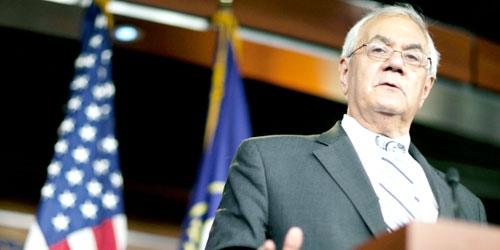By Lisa Keen

Keen News Service
Something changed for U.S. Rep. Barney Frank between February and November of this year. In February, he announced he would seek re-election in 2012, to a 17th term in office. And on Nov. 28, he announced this current term would be his last.
The announcement was big political news on the front pages of most media outlets this week, but it is more than just front-page news for the LGBT community. It is the loss of the community's most powerful player in the national political arena. Frank is not only one of just four openly gay members of Congress; he is the most senior, the one with the most legislative know-how, and the one with the greatest chance of getting pro-LGBT measures passed.
It was Frank who made the critical deal that led to passage of Don't Ask Don't Tell in 1993, a compromise that was unpopular with the community but far better than the complete ban on gays that many in Congress sought. And it was Frank who helped lead the charge with Rep. Patrick Murphy in repealing Don't Ask, Don't Tell (DADT) through a bill passed last year. It was Frank who decided to send through the Employment Non-Discrimination Act (ENDA) without gender identity in 2007 and saw it passed by the House. And it was Frank who agreed to add gender identity to the bill during the last term even though he knows it won't pass the Republican-controlled House.
Frank acknowledged in a press conference Nov. 29 that he doesn't believe ENDA will pass unless Democrats control both houses of Congress and the White House. But even more important may be the absence of Frank himself.
In explaining his decision to retire at the end of this term, Frank said he does not have the energy or capacity to wage a full-time campaign for re-election, now that his Congressional district has been redrawn to include more than 300,000 new constituents in some geographic areas of Massachusetts that he is not familiar to or with. He said he had "always" planned to retire before he turned 75 and that addressing the concerns of these new constituents "requires a time commitment longer than the next two years."
Frank acknowledged, albeit indirectly, the impact of his absence, saying it is "important" to have openly LGBT people in Congress to drive home the reality of discrimination.
"The best antidote to prejudice is reality," said Frank. Frank said he was "proud" to have "voluntarily" acknowledge publicly that he was gay in 1987.
Frank's acknowledging he was gay did not cost him the support of voters, but voter support began to erode over the past few re-elections and, in 2010, he won re-election with only 54 percent of the vote, well below his previous low of 68 percent.
Frank said "there are other things in my life I'd like to do," such as "writing, teaching, and lecturing." He also hinted he might consider some pro bono appearances on "gay rights."
Frank talked about the prospects of being able to speak freely as a private citizen. One idea that seemed particularly interesting to him was do such things as debate Republican presidential hopeful Newt Gingrich on the Defense of Marriage Act.
"I think he is an ideal opponent for us when we talk about just who it is who is threatening the sanctity of marriage," said Frank, an obvious reference to Gingrich being on his third marriage. It was a sign that, while Frank is leaving the political arena, he is still a political animal.










